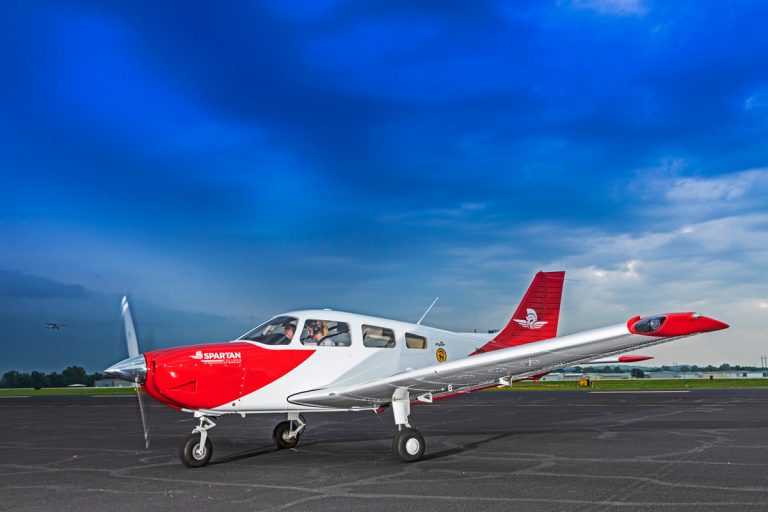

Spartan College of Aeronautics and Technology is a prominent voice in the aviation space. These blogs are for informational purposes only and are meant to spark discussions within the aviation industry on a variety of topics.

An aviation career, especially one as a pilot, is a dream for many people. If you've considered flight school, you may wonder, "what will I need to learn beyond take-offs and landings?" This article, presented by Spartan College of Aeronautics and Technology, guides the subjects and skills you'll learn in a pilot training program.
Throughout your entire training as a pilot, your instructor will teach you skills and knowledge with reference to the FARs – Federal Aviation Regulations. These are the many rules and restrictions that the Federal Aviation Administration applies to civilian flight. Your instructor will refer to different numbered "parts," with which you will quickly become familiar. These could include:
Your school may also advertise itself as a "Part 141" school, and this means it is certified under FAR Part 141, which outlines requirements for structured pilot schools.
Early in your pilot training program, you'll take some time to familiarize yourself with the parts of the plane you'll be flying. This can include external components, like the wings and ailerons—the hinged flaps on the trailing edge of a wing that help control the degree of roll. You'll also need to understand the instruments in the cockpit, including navigational and communication systems. Your flight instructor will also cover the fuel system, the oil system, engines, and electrical systems. In addition, you will get to know your aircraft's engine.
Finally, you will learn to compare and contrast the performance of different aircraft using charts. Knowledge of your aircraft's parts and systems will help you file accurate flight logs and communicate effectively with maintenance personnel. Overall, it will make you a safer, more knowledgeable pilot.
In addition to the basics of your aircraft, your pilot training will introduce you to the principles of flight. This is not usually presented in a classical physics context, involving heavy use of higher mathematics. Instead, pilots learn applied physics by studying the different maneuvers of an aircraft and investigating the different forces at work. These include forces such as the Bernoulli Principle, which explains how the various pressures of air flowing over and under an airplane wing generate lift.
You will pick up the different principles of flight as you take your first flight with your instructor and progress toward a solo flight. You will also study how to keep the aircraft balanced in flight by looking at how weighting the aircraft with cargo, passengers, or fuel can affect its performance. A solid grounding in the principles of flight provides a foundation for all of your future training.
FAA regulations require pilots to be physically fit, free from seizure disorders, severe mental impairments, and cardiovascular disease. The tests and requirements become stricter as a pilot advances through their career. For example, private pilots need a simple physical examination conducted by an Aviation Medical Examiner or a local physician authorized by the FAA to examine future pilots. Airline pilots need yearly or six-monthly heart function tests and scans.
In your pilot training, you will learn what the FAA requires of pilots in terms of health, vision, and physical fitness. You will also study aeromedicine—the effects of flight on the human body. This will help you understand how atmospheric pressure and other aerodynamic forces cause changes in passengers and crew. You will be prepared to react effectively in medical emergencies. As a pilot, you must remain physically healthy and to ensure the physical health of others.
Weather conditions play a tremendous role in a pilot's life. Winds, cross-winds, turbulence, and storms must be considered when planning your flights and operating an aircraft.
As you progress from a student pilot toward a commercial rating, you will study weather conditions' effects on flying. You will study different weather phenomena, including:
You will also learn how to use the weather information available to plan and safely complete your flights.

Navigation is the process of planning, controlling, and recording your aircraft's movement from place to place. When you begin flight school, you will learn the basics of aeronautical navigation to operate an aircraft under Visual Flight Rules (VFR). Your first lessons will focus on using visual cues, magnetic compass readings, and dead reckoning (the process of determining your position based on the last known position). You will also learn to use radio navigation, air traffic control radar, and flight computers.
As you progress towards commercial pilot licensing, you will start to familiarize yourself with other navigational instruments and techniques. These more advanced navigational principles will prepare you to fly under Instrument Flight Rules (IFR) in conditions where visual cues cannot be used, such as poor weather or clouds. You will learn to use GPS systems and the network of Non-Directional Beacons and VHF Omnidirectional Range radio transmitters to help position your aircraft and stay on course. You will also learn how to proceed if your navigation and communications systems fail.
Flight planning is an important pilot duty. FAA regulations require pilots to file flight plans with the airports they will depart from and arrive at before taking off. As part of your training, you'll be required to read and understand aeronautical charts and file accurate flight plans.
Finally, the part most aspiring pilots are interested in: flying the aircraft. In a pilot school, you'll gain flying skills and experience alongside the above-mentioned aeronautical knowledge, progressing steadily from more basic to more advanced. For Private Pilot certification, you'll need to demonstrate that you have the skills necessary to perform a cross-country flight. A cross-country flight is any flight that covers more than 25 nautical miles and goes from airport to airport. Your instructor will teach you skills, including:
When preparing for your Commercial Pilot certification, you'll also need to demonstrate knowledge of high-altitude operations and post-flight procedures and show you have some experience flying at night. Additionally, your instructor will familiarize you with the National Transportation Safety Board's accident reporting requirements.
As a pilot, you earn the privilege of commanding an aircraft. A quality flight school will emphasize your responsibility to remain worthy of this privilege, and teach you preparedness, vigilance, and accountability.
Affiliate Partner Program | Jobs at Spartan | Privacy Policy | Opt-out Policy | Privacy Notice - California Residents| Notice of Non-Discrimination | Website Accessibility Help | Transparency in Coverage Act
© 2024 SPARTAN COLLEGE OF AERONAUTICS AND TECHNOLOGY. ALL RIGHTS RESERVED.